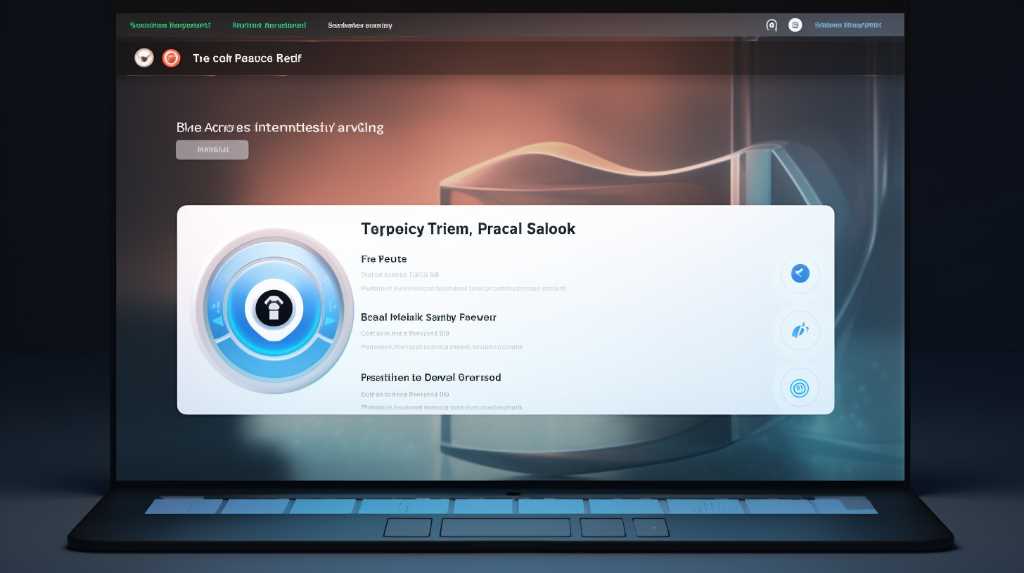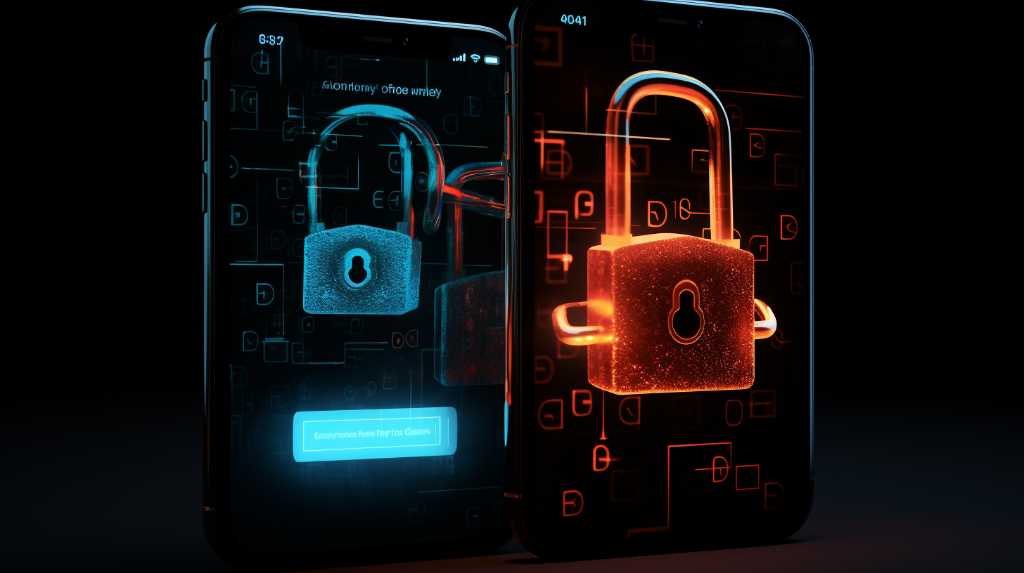Are you concerned about the security of your passwords? In this article, we will guide you through the best practices for password security. Discover the importance of strong and unique passwords, as well as the role of password managers in keeping your accounts safe. Learn about two-factor authentication and why avoiding password reuse is crucial. Don't let weak passwords put your personal information at risk - read on to protect yourself online.
 This means that even if someone manages to guess or steal your password, they'd still need the second factor, such as a fingerprint or a unique code sent to your phone, to gain access. By using two-factor authentication, you significantly reduce the risk of unauthorized access to your accounts, as it becomes much more difficult for hackers to bypass this additional layer of security. It's important to enable two-factor authentication on all your important accounts, such as email, social media, and banking, to ensure maximum security and protect your personal information.
This means that even if someone manages to guess or steal your password, they'd still need the second factor, such as a fingerprint or a unique code sent to your phone, to gain access. By using two-factor authentication, you significantly reduce the risk of unauthorized access to your accounts, as it becomes much more difficult for hackers to bypass this additional layer of security. It's important to enable two-factor authentication on all your important accounts, such as email, social media, and banking, to ensure maximum security and protect your personal information.
 Furthermore, a password manager can also generate and store other sensitive information, such as credit card details and addresses, making online shopping more convenient and secure. It encrypts this information and provides an additional layer of protection against identity theft.
Furthermore, a password manager can also generate and store other sensitive information, such as credit card details and addresses, making online shopping more convenient and secure. It encrypts this information and provides an additional layer of protection against identity theft.
 One of the dangers of weak passwords is that they can be easily guessed. Hackers use sophisticated software programs that can quickly generate and test thousands of common passwords. By using a weak password, you're essentially giving them the keys to your digital life. Another danger is that weak passwords can be easily cracked through brute force attacks. These attacks involve repeatedly guessing different combinations of characters until the correct password is found.
In addition, weak passwords can also make you vulnerable to phishing attacks. Phishing is a technique used by cybercriminals to trick individuals into revealing their passwords and other sensitive information. They do this by sending deceptive emails or creating fake websites that mimic legitimate ones. If your password is weak, it becomes much easier for these attackers to gain access to your accounts.
One of the dangers of weak passwords is that they can be easily guessed. Hackers use sophisticated software programs that can quickly generate and test thousands of common passwords. By using a weak password, you're essentially giving them the keys to your digital life. Another danger is that weak passwords can be easily cracked through brute force attacks. These attacks involve repeatedly guessing different combinations of characters until the correct password is found.
In addition, weak passwords can also make you vulnerable to phishing attacks. Phishing is a technique used by cybercriminals to trick individuals into revealing their passwords and other sensitive information. They do this by sending deceptive emails or creating fake websites that mimic legitimate ones. If your password is weak, it becomes much easier for these attackers to gain access to your accounts.
Key Takeaways
- Strong passwords protect sensitive information
- Using a password manager generates and stores unique passwords for all accounts
- Two-factor authentication requires two different credentials for account access
- Regularly update passwords to ensure safety of personal information
The Importance of Strong Passwords
You should always use strong passwords to protect your sensitive information. In today's digital age, where almost every aspect of our lives is connected to the internet, it's crucial to prioritize the security of our passwords. Weak or easily guessable passwords can leave your personal and financial information vulnerable to hackers and identity thieves. A strong password is a combination of uppercase and lowercase letters, numbers, and special characters. It should be at least eight characters long and unique for every online account you have. Avoid using common words, birthdates, or sequential numbers that can be easily guessed. Instead, create passwords that are random and complex, such as 'P@ssw0rd!987.' Using strong passwords adds an extra layer of protection to your sensitive data. It makes it much harder for cybercriminals to crack your password and gain unauthorized access to your accounts. Remember, it's not just your email or social media accounts that need strong passwords. Your online banking, shopping, and other financial platforms should also have robust passwords to safeguard your financial information. Additionally, it's crucial to regularly update your passwords. Change them every three to six months or whenever you suspect any suspicious activity. This practice helps ensure that even if someone manages to guess your password, they won't have long-term access to your accounts.Creating Unique Passwords
Now let's talk about the benefits of using a password manager. By using a password manager, you can easily generate and store unique passwords for all your accounts, ensuring better security. Additionally, let's not forget the importance of two-factor authentication, which adds an extra layer of protection to your accounts.Password Manager Benefits
Using a password manager allows you to effortlessly generate unique passwords for all your accounts. This is one of the major benefits of using a password manager. With a password manager, you don't have to come up with and remember different passwords for each of your accounts. Instead, the password manager tool can generate strong, random passwords for you. These passwords are typically long, complex, and include a combination of letters, numbers, and special characters. By using unique passwords for each account, you greatly enhance your online security. Even if one of your accounts is compromised, the rest of your accounts remain safe because the passwords aren't reused.Two-Factor Authentication Importance
Implementing two-factor authentication is an essential step in creating unique passwords for enhanced security. Two-factor authentication provides an additional layer of protection by requiring you to provide two different types of credentials to access your accounts. This means that even if someone manages to guess or steal your password, they'd still need the second factor, such as a fingerprint or a unique code sent to your phone, to gain access. By using two-factor authentication, you significantly reduce the risk of unauthorized access to your accounts, as it becomes much more difficult for hackers to bypass this additional layer of security. It's important to enable two-factor authentication on all your important accounts, such as email, social media, and banking, to ensure maximum security and protect your personal information.
This means that even if someone manages to guess or steal your password, they'd still need the second factor, such as a fingerprint or a unique code sent to your phone, to gain access. By using two-factor authentication, you significantly reduce the risk of unauthorized access to your accounts, as it becomes much more difficult for hackers to bypass this additional layer of security. It's important to enable two-factor authentication on all your important accounts, such as email, social media, and banking, to ensure maximum security and protect your personal information.
Best Practices for Password Management
Now let's talk about the best practices for managing your passwords. It's important to create strong passwords that are unique to each account you have. This adds an extra layer of security and reduces the risk of unauthorized access. Additionally, implementing multi-factor authentication provides added benefits by requiring multiple forms of verification to access your accounts.Strong Password Creation
When creating strong passwords, make sure to include a combination of uppercase and lowercase letters, numbers, and special characters. By incorporating these elements, you significantly enhance the security of your passwords and make them more difficult for hackers to crack. Using a mix of uppercase and lowercase letters adds an extra layer of complexity to your password, making it harder to guess. Including numbers and special characters further strengthens your password's security by increasing the number of possible combinations. Avoid using common phrases, dictionary words, or personal information as they can be easily guessed. Instead, consider using a passphrase or combining unrelated words to create a unique and memorable password.Multi-Factor Authentication Benefits
You can greatly enhance the security of your passwords by utilizing multi-factor authentication. Multi-factor authentication adds an extra layer of protection to your accounts by requiring multiple forms of verification before granting access. This means that even if someone manages to obtain your password, they still need additional information, such as a unique code sent to your phone or a fingerprint scan, to gain entry. By implementing multi-factor authentication, you significantly reduce the risk of unauthorized access to your accounts. This is especially important for sensitive information, such as financial accounts or personal emails. It's a best practice to enable multi-factor authentication whenever possible to ensure the highest level of password security.The Role of Password Managers
Using a password manager can significantly enhance your online security. With the increasing number of online accounts and the need to create unique and complex passwords for each one, it can be challenging to remember them all. This is where a password manager comes in handy. A password manager is a tool that securely stores all your passwords in an encrypted database. It generates strong, unique passwords for each of your accounts and automatically fills them in when needed. This eliminates the need to remember multiple passwords or write them down, reducing the risk of password theft or unauthorized access. Another advantage of using a password manager is that it helps prevent password reuse. Many people tend to reuse passwords across multiple accounts for convenience. However, if one account gets compromised, all your other accounts become vulnerable. A password manager encourages you to use unique passwords for each account, reducing the impact of a potential breach. Furthermore, a password manager can also generate and store other sensitive information, such as credit card details and addresses, making online shopping more convenient and secure. It encrypts this information and provides an additional layer of protection against identity theft.
Furthermore, a password manager can also generate and store other sensitive information, such as credit card details and addresses, making online shopping more convenient and secure. It encrypts this information and provides an additional layer of protection against identity theft.
Understanding Two-Factor Authentication (2FA)
Enable two-factor authentication (2FA) to add an extra layer of security to your online accounts. 2FA is a security measure that requires you to provide two pieces of information to verify your identity, typically a password and a unique code sent to your phone or email. This additional step makes it much harder for hackers to gain access to your accounts, even if they manage to obtain your password. When you enable 2FA, you create an additional barrier that must be overcome before anyone can access your account. Even if someone has your password, they won't be able to log in without the second factor, which is usually a temporary code. This code is often sent to your phone or email, ensuring that only you have access to it. 2FA is particularly important for accounts that contain sensitive information or have access to financial transactions. By enabling this feature, you greatly reduce the risk of unauthorized access and protect your personal and financial data. It may take a little extra time to enter the verification code, but the added security is well worth the effort. Many online services now offer 2FA as an option, so take advantage of this feature whenever it's available. By enabling two-factor authentication, you're taking a proactive step towards safeguarding your online accounts and protecting your valuable information.Avoiding Password Reuse
Avoiding password reuse is a crucial practice for maintaining strong online security. Using the same password for multiple accounts makes it easier for hackers to gain unauthorized access to your personal information. When you reuse passwords, a breach in one account can lead to a domino effect, compromising all your other accounts. To avoid this, it's essential to create unique passwords for each online account you have. One effective way to manage multiple passwords is by using a password manager. These tools securely store your passwords and generate strong, unique passwords for each website or application you use. With a password manager, you only need to remember one master password, making it easier to maintain strong and diverse passwords without the risk of forgetting them. It is also important to avoid using predictable patterns or easily guessable information when creating passwords. Avoid using common words, birthdates, or sequential numbers. Instead, mix uppercase and lowercase letters, include numbers, and special characters to increase the complexity of your passwords. Regularly updating your passwords is another good practice to follow. Set a reminder to change your passwords every few months or after a major security breach. This will help ensure that even if one of your passwords is compromised, the others remain secure.Dangers of Weak Passwords
To ensure the safety of your personal information, it's important to regularly update your passwords and avoid weak ones. Weak passwords pose a significant threat to your online security. They make it easier for hackers to gain unauthorized access to your accounts and steal your personal data. Using common words or predictable patterns, such as “password” or “123456,” makes it incredibly easy for hackers to crack your password and compromise your sensitive information. One of the dangers of weak passwords is that they can be easily guessed. Hackers use sophisticated software programs that can quickly generate and test thousands of common passwords. By using a weak password, you're essentially giving them the keys to your digital life. Another danger is that weak passwords can be easily cracked through brute force attacks. These attacks involve repeatedly guessing different combinations of characters until the correct password is found.
In addition, weak passwords can also make you vulnerable to phishing attacks. Phishing is a technique used by cybercriminals to trick individuals into revealing their passwords and other sensitive information. They do this by sending deceptive emails or creating fake websites that mimic legitimate ones. If your password is weak, it becomes much easier for these attackers to gain access to your accounts.
One of the dangers of weak passwords is that they can be easily guessed. Hackers use sophisticated software programs that can quickly generate and test thousands of common passwords. By using a weak password, you're essentially giving them the keys to your digital life. Another danger is that weak passwords can be easily cracked through brute force attacks. These attacks involve repeatedly guessing different combinations of characters until the correct password is found.
In addition, weak passwords can also make you vulnerable to phishing attacks. Phishing is a technique used by cybercriminals to trick individuals into revealing their passwords and other sensitive information. They do this by sending deceptive emails or creating fake websites that mimic legitimate ones. If your password is weak, it becomes much easier for these attackers to gain access to your accounts.

